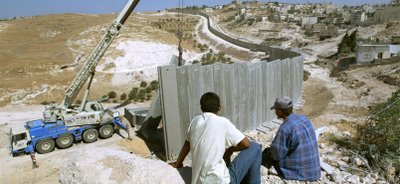Promoting conflict through unilateral withdrawals
Where to begin? War always accelerates change. Too much happening in the region and at work.
One thing you can generally count on is for the Washington Post editorials to take a decidely more conservative bent then the paper's actual coverage. I find a lot of the Post's coverage to be pretty decent, but the editorials leave a lot to be desired.
Like today's. While the general premise might be right, that now is not the time for grandiose actions in the name of peace, the following assessment couldn't be more wrong. The Post editorial board writes:
The war has probably killed the only promising prospect of a step toward Israeli-Palestinian peace, which was Israeli Prime Minister Ehud Olmert's plan to unilaterally withdraw Israeli settlements and troops from most of the West Bank.
Not only is this statement patently false (the Israeli plan does not call for a withdrawal from "most" of the West Bank), it is horribly unwise. Unilateral withdrawals are a disasterous idea, and are a major factor in the continuation of violence, not a prelude to the outbreak of peace. Israel thinks it can just divorce itself of those aspects of lands it occupies without a political settlement. That is the worst way to try to solve a problem. Have they and the Post's editors learned nothing from Lebanon and Gaza?
Israel's planned unilateral withdrawal from the West Bank was going to take the vast majority of the land of the West Bank, either for preexisting settlements or as security zones, would retain the security barriers, check points and bypass roads that criss-cross the remaining areas left for Palestinians, and would do NOTHING to solve any of the political issues at the heart of the conflict. In short, it is gauranteed to ensure that the conflict continues, if not escalates.
The Israeli withdrawal plan basically calls for the creation of three more Gaza Strip-like enclaves in the West Bank. It is nothing even close to a state much less even autonomous zones.
Israel will not have peace or security so long as it thinks it can rely on military force alone as a means to solve its differences with either its Palestinian or other neighbors. It can not force what it thinks is an acceptable settlement on it's neighbors, declare peace and then hunker down behind it's walls and military forces. Lebanon has proven that. There must be a mutally agreed upon political settlement for their to be peace.
Such a settlement is very possible, but Israel refuses to agree to it. It is present in the Arab Peace Plan of 2002, in which all states of the Arab League agree to full recognition of Israel, establishment of full diplomatic relations and other normal relations between states on the basis of a Palestinian state being founded in all the lands of the West Bank and Gaza Strip, minus minor modifications to accomodate Israel's vast settlements in these lands.
Both the PLO and Hamas have agreed to this, albeit for Hamas it has said it will abide by such an arrangement, and recognize Israel as part of a complete settlement of the issues. Even Iran has now said they will agree to this plan. So why doesn't Israel take them up on it, if it wants true and lasting peace? Because the Israeli public and Israeli politicians do not agree to giving up most of the West Bank for a Palestinian state. Yet that is the only way they will have peace, short of the creation of a binational state, which Israelis will definately never accept.
The Post also repeats the mantra about Hamas not recognizing Israel. Again, when has Israel really recognized the right of the Palestinians to establish a state. What Israel is recognizing is the right of Palestinians to live in their isolated ghettos within "Judea and Samaria", surrounded by Israeli walls, soliders, security zones and settlements. That is not recognition of the right to a state. That is admission that Israel will not accept a Palestinian state.
There's more to criticize the the Post editorial but I've said enough already.

